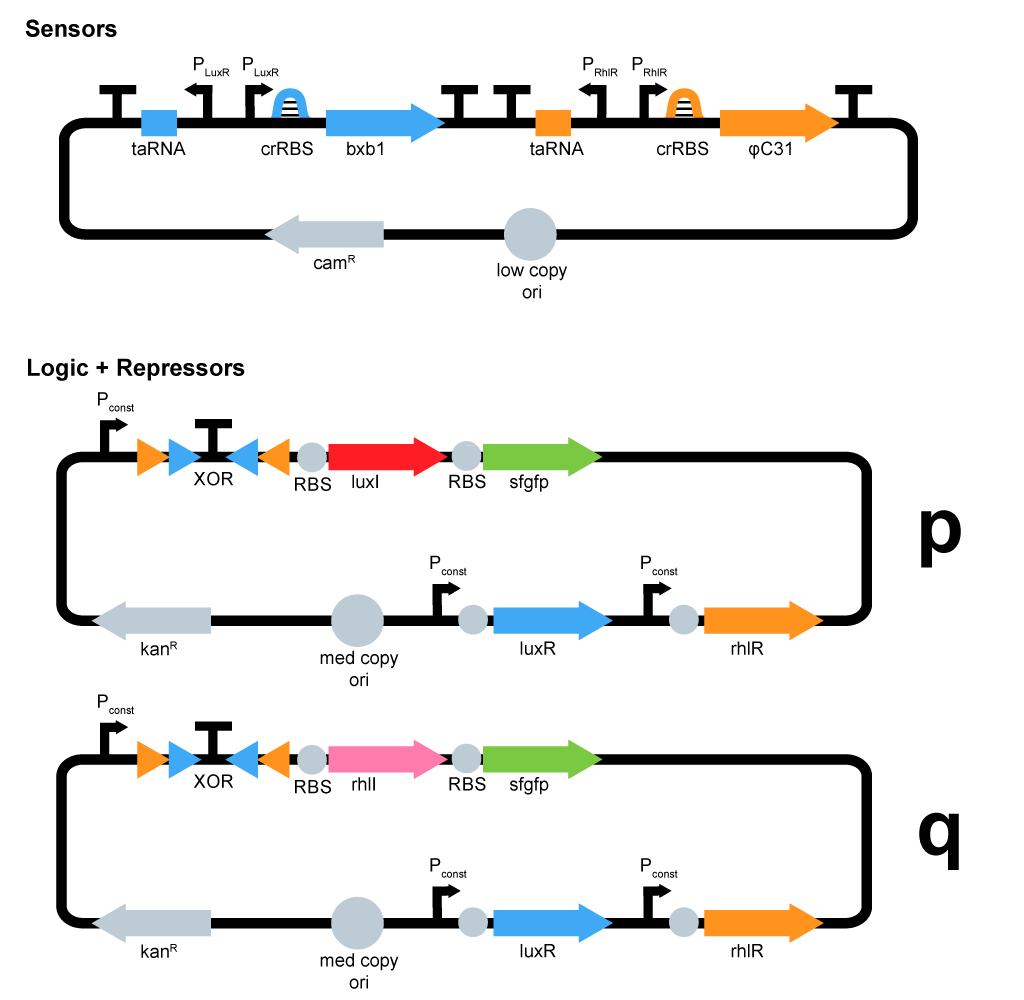Team:ETH Zurich/labblog/20140611meet
From 2014.igem.org
(Difference between revisions)
(→Wednesday, June 11th) |
(→Week 3) |
||
| (8 intermediate revisions not shown) | |||
| Line 1: | Line 1: | ||
| - | <html><article class=" | + | <html><article class="mix meetings carousel" id='week3' date="20140604"></html> |
| - | == Week 3 == | + | == Week 3: Plasmid design started, Modeling started == |
==== Wednesday, June 11th ==== | ==== Wednesday, June 11th ==== | ||
* We started plasmid design : | * We started plasmid design : | ||
| - | [[File:ETH Zurich Plasmids.png| | + | [[File:ETH Zurich Plasmids.png|center|600px|thumb|First draft of plasmids|First draft of plasmids. The sensor plasmid is the same in every cell. Different logic + repressors plasmids are present in cells p and q. The logic + repressors plasmid from cells p is producing the quorum sensing molecule p, and another version is present in cells q which produces QSq. Colonies of p and q cells will be arranged in an alternate way on the millifluidic chip. Here as an example we use the lux system for p cells and the rhl system for q cells.]] |
ΦC31 and Bxb1 are integrases. LuxR an RhlR are quorum sensing repressors. A riboswitch construct is placed around quorum sensing constructs to prevent leakiness of lux and rhl promoters. Type p colonies produce AHL by expressing the enzyme LuxI. Type q colonies produce Rhl by expressing the enzyme RhlI. In fact, we don't know yet which quorum sensing systems we will use. We will have to perform cross-talk experimetns in order to choose the ones that are the most orthogonal. | ΦC31 and Bxb1 are integrases. LuxR an RhlR are quorum sensing repressors. A riboswitch construct is placed around quorum sensing constructs to prevent leakiness of lux and rhl promoters. Type p colonies produce AHL by expressing the enzyme LuxI. Type q colonies produce Rhl by expressing the enzyme RhlI. In fact, we don't know yet which quorum sensing systems we will use. We will have to perform cross-talk experimetns in order to choose the ones that are the most orthogonal. | ||
| Line 12: | Line 12: | ||
* We wrote all reactions and found parameters from the literature for our model. | * We wrote all reactions and found parameters from the literature for our model. | ||
| + | {{:Team:ETH Zurich/tpl/topbutton|silver}} | ||
| - | + | {{:Team:ETH Zurich/tpl/rmbutton|silver|week3}} | |
| - | <html></article></html> | + | |
| + | <html> </article></html> | ||
Latest revision as of 22:00, 11 October 2014
Week 3: Plasmid design started, Modeling started
Wednesday, June 11th
- We started plasmid design :

First draft of plasmids. The sensor plasmid is the same in every cell. Different logic + repressors plasmids are present in cells p and q. The logic + repressors plasmid from cells p is producing the quorum sensing molecule p, and another version is present in cells q which produces QSq. Colonies of p and q cells will be arranged in an alternate way on the millifluidic chip. Here as an example we use the lux system for p cells and the rhl system for q cells.
ΦC31 and Bxb1 are integrases. LuxR an RhlR are quorum sensing repressors. A riboswitch construct is placed around quorum sensing constructs to prevent leakiness of lux and rhl promoters. Type p colonies produce AHL by expressing the enzyme LuxI. Type q colonies produce Rhl by expressing the enzyme RhlI. In fact, we don't know yet which quorum sensing systems we will use. We will have to perform cross-talk experimetns in order to choose the ones that are the most orthogonal.
- We tried to print our first agar millifluidic chip : we printed it too small, and the printer had resolution problems.
- We wrote all reactions and found parameters from the literature for our model.
 "
"